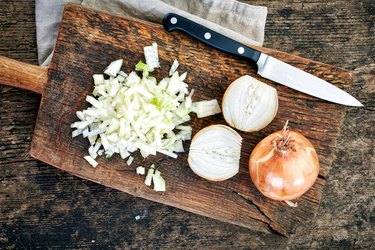
You may have heard the rumors, passed from blog to blog and through recipe comments, that cutting onions and storing them, for any amount of time, makes them unsafe to eat. This is just not true. The answer to the question, "Are old onions safe to eat?" is a resounding yes.
Tip
Cutting onions and storing them in your fridge doesn’t make them unsafe to eat. Their fresh flavor may be off, but they aren’t a danger to your health.
Video of the Day
Do Cut Onions Become Toxic?
The myth is that as soon as you cut up onions, they become a breeding ground for bacteria — so much so that leaving cut onions in the fridge makes them poisonous, even if it's just overnight. As pointed out by experts at McGill University's Office of Science and Society, this really isn't true.
Video of the Day
Onions aren't vulnerable to bacterial compounds; the sulfur compounds in them (which make you cry) are repellent to bacteria. Plus, onions dry out soon after you cut them, but bacteria likes to grow in moist environments. Bacteria also prefers to grow on items with a high protein content, and onions don't contain much protein at all.
Now if you cut your onions with a dirty knife or on a dirty cutting board, they may be exposed to bacteria, and could make you sick. Food spoilage bacteria isn't spread via the air. If your cut onions come into contact with bacteria, it doesn't matter if they're stored overnight in the fridge, or used right away. You're vulnerable to getting sick, regardless.
Old onions are safe to eat as long as they're not too old. Old onions can develop mold, which travels via the air — but that's not likely if they've been in the fridge just one day.
Why Aren’t Onions Sold Cut?
Despite there being a great demand for prepackaged, cut onions, they aren't readily available. This isn't because they become dangerous to eat when cut in advance, but rather has to do with how they deteriorate due to changes in the physical and chemical structure.
Read more: Fresh Green Onion Dip
Comprehensive Reviews in Food Science and Food Safety published analysis in January 2018 noting that producers haven't developed strategies to combat these changes in onions, and don't know how to protect them for the long-term against invading microorganisms. These microorganisms can infiltrate any food if it's old enough — onions aren't special. Onions cut a day in advance are unlikely to be spoiled, unless you leave the cut onions out of the fridge overnight.
Onions haven't responded well to the use of natural food preservatives, so attempts at developing a version of pre-cut and packaged onions have been, as yet, unsuccessful. So far, attempts to maximize shelf-life have not worked.
Can I Cook Old Onions?
The biggest danger in cooking day-old, cut onions is to the integrity of your recipe's flavor. When staffers at the magazine Cook's Illustrated cooked 4-day-old onions in butter, tasters found the onions had a bland, sour flavor compared to onions chopped just before cooking. However, when these older onions were incorporated into an entire dish as a less-important ingredient, tasters could barely detect a difference.
Read more: Top 10 Healthiest Fruits and Vegetables
None of the tasters fell ill, or felt as if they were endangering their health by eating the older, chopped onions. When onions are cut, they release enzymes called alliinases. These enzymes interact with amino acids contained in the onions to create a sulfurous, unpleasant odor if they sit out long enough. This flavor can penetrate your dish if the onions are the star of your recipe. If they're just one of many flavoring agents, older, cut onions are just fine to use.